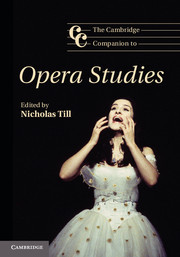Description
The Cambridge Companion to Opera Studies
Cambridge Companions to Music Series
Coordinator: Till Nicholas
The first comprehensive attempt to map the current field of opera studies by leading scholars in the discipline.
Language: English
The Cambridge Companion to Opera Studies
Publication date: 10-2012
Support: Print on demand
Publication date: 10-2012
Support: Print on demand
The Cambridge Companion to Opera Studies
Publication date: 10-2012
Support: Print on demand
Publication date: 10-2012
Support: Print on demand
Description
/li>Contents
/li>Biography
/li>
With its powerful combination of music and theatre, opera is one of the most complex and yet immediate of all art forms. Once opera was studied only as 'a stepchild of musicology', but in the past two decades opera studies have experienced an explosion of energy with the introduction of new approaches drawn from disciplines such as social anthropology and performance studies to media theory, genre theory, gender studies and reception history. Written by leading scholars in opera studies today, this Companion offers a wide-ranging guide to a rapidly expanding field of study and new ways of thinking about a rich and intriguing art form, placing opera back at the centre of our understanding of Western culture over the past 400 years. This book gives lovers of opera as well as those studying the subject a comprehensive approach to the many facets of opera in the past and today.
Introduction: opera studies today Nicholas Till; Part I. Institutions: 1. Opera, the state and society Thomas Ertman; 2. The business of opera Nicholas Payne; 3. The operatic event: opera houses and opera audiences Nicholas Till; Part II. Constituents: 4. 'Too much music': the media of opera Christopher Morris; 5. Voices and singers Susan Rutherford; 6. Opera and modes of theatrical production Simon Williams; 7. Opera and the technologies of theatrical production Nicholas Ridout; Part III. Forms: 8. The dramaturgy of opera Laurel E. Zeiss; 9. Genre and poetics Alessandra Campana; 10. The operatic work: texts, performances, receptions and repertories Nicholas Till; Part IV. Issues: 11. Opera and gender studies Heather Hadlock; 12. Opera and national identity Suzanne Aspden; 13. 'An exotic and irrational entertainment': opera and our others, opera as other Nicholas Till.
Nicholas Till is Professor of Opera and Music Theatre and Leverhulme Research Fellow at the University of Sussex. He has previously worked as a director for opera companies in the UK and Europe and as a librettist and director for new works performed by Royal Opera Garden Venture, English National Opera Studio and Stuttgart Opera, among others. He is the author of Mozart and the Enlightenment (1992), has written extensively on contemporary opera and music theatre and has taught in many fields, including visual arts, theatre and film. As Director of the Centre for Research in Opera and Music Theatre at the University of Sussex, he regularly contributes talks and programme articles to opera companies in the UK, Europe and the USA and is a frequent contributor to radio and television programmes. He is currently working on a book about the origins of opera in the seventeenth century.
© 2024 LAVOISIER S.A.S.
These books may interest you

PhantasmagoriaSociology of Opera 178.41 €

PhantasmagoriaSociology of Opera 56.31 €



